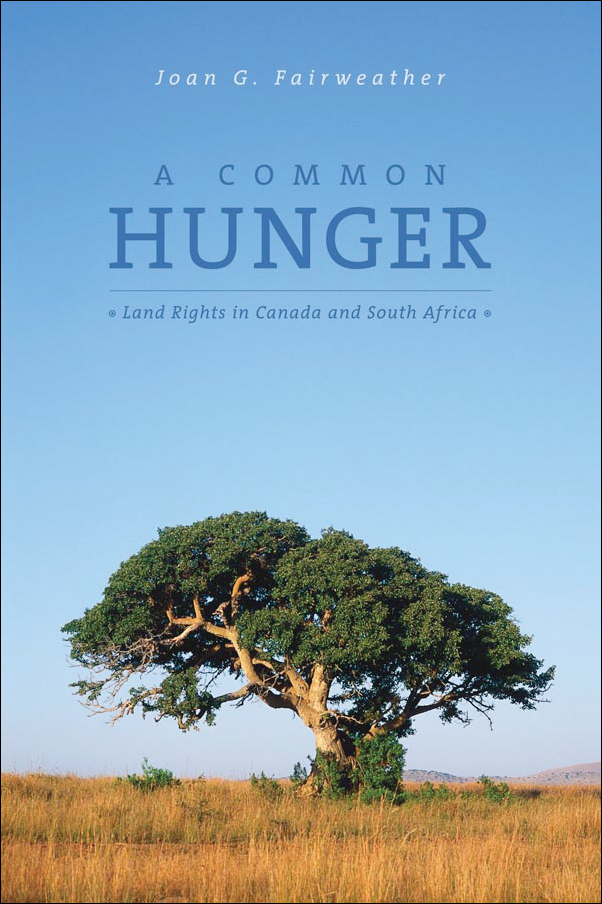
A Common Hunger: Land Rights in Canada and South Africa
Joan G. Fairweather
$39.99 CAD / $45.99 USD (S)
284 pages, 29 illustrations
6 x 9 Inches
Paperback: 978-1-55238-192-2
Library PDF: 978-1-55238-313-1
October 2006
A balanced examination of land claim processes that brings historical context to ongoing discussions of the effects of land dispossession and efforts to ensure that justice is done.
Geographically, demographically, and politically, South Africa and Canada are two countries that are very far apart. What they have in common are Indigenous populations, which, because of their historical and ongoing experience of colonization and dispossession, share a hunger for land and human dignity.
Based on extensive research carried out in both countries, A Common Hunger is a comparative work on the history of Indigenous land rights in Canada and post-apartheid South Africa. Joan Fairweather has constructed a balanced examination of the impact of land dispossession on the lives of indigenous peoples in both countries and their response to centuries of European domination.
By reclaiming rights to the land and an equitable share in the wealth-producing resources they contain, the first peoples of Canada and South Africa are taking important steps to confront the legacies of poverty that characterize many of their communities. A Common Hunger provides historical context to the current land claim process in these two former British colonies and examines the efforts of governments and the courts to ensure that justice is done.
Joan G. Fairweather is a South African historian, archivist and writer living in Ottawa. After many years as a sound and film archivist at Library and Archives Canada, she worked at the Open Society Archives in Budapest and more recently in South Africa at the Mayibuye Centre for History and Culture in South Africa, now part of the Robben Island Museum in Cape Town.
Preface
Maps
List of Illustrations
List of Maps & Acknowledgements
Introduction
Canada and South Africa: Aboriginal Rights and International Law
The Clearing of Lands and Languages
Part One–Disposession
The Land and the People
The First Peoples of the Cape of Good Hope
The First Peoples of North America
Slavery in New France and the Cape Colony
British North America
The Cape under British Rule
Frontier Societies
Conclusion
Introduction
Canadian Treaties
Treaties in Colonial South Africa
Discussion: Strategies of Land Alienation
Conclusion
Sovereignty and Segrigation
Introduction
Sovereignty and Constitutional Rights in Canada
Assimilation in Twentieth–Century Canada
Sovereignty in South Africa
Pragmatic Segregation in South Africa
Ideological Segregation: Apartheid South Africa
The Struggle for Sovereignty in South Africa
Challenging the Concept of Sovereignty in Canada
Conclusion
Part Two–Reclaiming the Land
Litigation
Introduction
Aboriginal Rights Court Cases in Canada
The Gitxsan and Wet’suwet’en of British Columbia
Delgamuukw v. British Columbia: The Supreme Court Decision (1997)
Aboriginal Litigation in South Africa
The Richtersveld Case: Background
The Richtersveld Community vs. Alexkor Ltd and the Government of the RSA (2000)
Conclusion
Negotiating Restitution
Introduction
Reclaiming the Land in South Africa
The Restitution Process in South Africa
Challenges to Restitution in South Africa
Case Study: The Mogopa Community, North West Province
Rebuilding Communities
The Conservation Factor
The Case of Kosi Bay, Maputland (KwaZulu–Natal)
Negotiating Land Restitution in Canada
The B.C. Treaty Comission
Conclusion
Self–Government
Restoring Sovereignty
Negotiating Self–Government in Canada
The Sechelt Agreement
The Inuit People of the Northwest Territories
The Nunavut Land Claim
Reversing “Self Government” in the Former Bantustans
Conclusion
Part Three–Dealing with Legacies
Restoring Dignity
The Hunger for Dignity
Legacies for Dispossession in Canada
Legacies of Dispossession in South Africa
The Problem of “Invsibility”
Land Matters: Restoring Dignity
Conclusion
Reconciliation
The Purpose of Public Inquiries
Canada’s Royal Commission on Aboriginal Peoples (1991–96)
Critiquing the RCAP Process
South Africa’s Truth and Reconciliation Commission (1996–98)
Critiquing the TRC
Reparations
Uncovering the Truth
Conclusion
Conclusion
Why Land Rights Matter
The Task of Nation–building in South Africa
The Power of Stories (Canada)
Appendix
Notes
Bibliography
Index
This interesting and well-documented book attempts the difficult task of comparing the histories of European occupation and subsequent dispossession, oppression, and struggles for liberation of indigenous/Aboriginal peoples in Canada and South Africa
—Allison Goebel, H-SAfrica
The strength of Fairweather’s book is its well-written narrative account of the injustices and hardship suffered by indigenous peoples in Canada and Black South Africa and her sympathetic but shrewd assessment of their prospects of recovery from this experience.
—Peter Russell, University of Toronto Quarterly